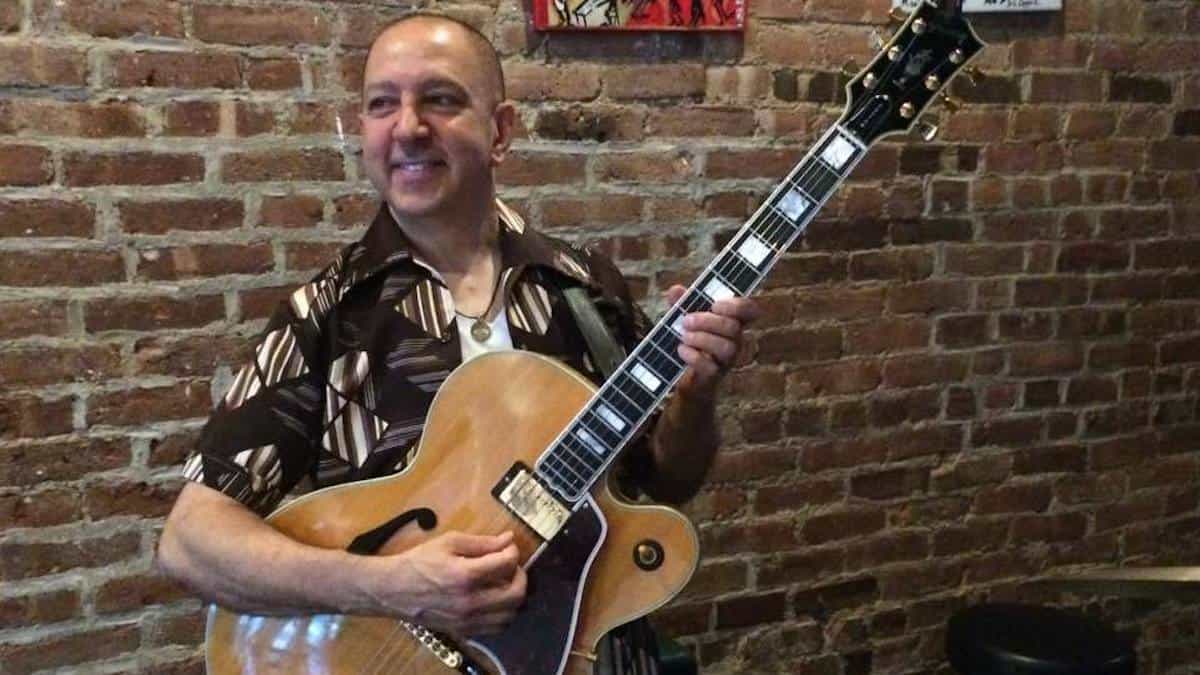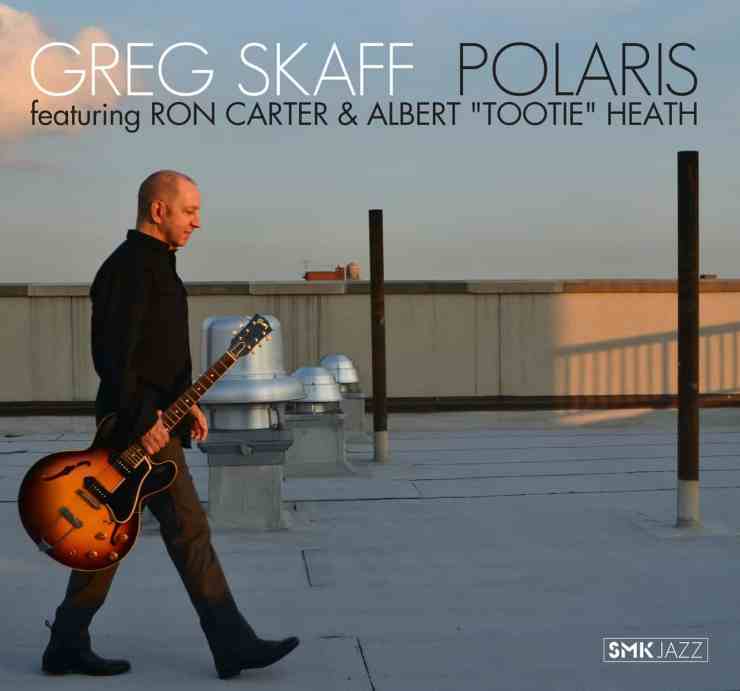Artist Features
Guitarist Greg Skaff Talks About His Upcoming Release, Polaris

Jazz Guitar Today contributor Tom Amoriello talks to jazz guitarist Greg Skaff about his upcoming release.
The career of guitarist Greg Skaff was launched with a five-year stint with legendary tenor saxophonist Stanley Turrentine (1934-2000). The Kansas native has been a first-call sideman in New York City ever since. In 2021, Skaff will release his next artist statement which features jazz rhythm royalty with the likes of Commander of the Order of Arts Ron Carter on bass and National Endowment for the Arts Jazz Master Albert Heath on drums. Jazz Guitar Today would like to thank Mr. Skafffor this exclusive interview.
JGT: Your latest offering Polaris will be released March 19th. This recording is a Guitar Trio that features bassist Ron Carter and drummer Albert “Tootie” Heath. Reflecting on the session, what is a takeaway for you from the push of record on the first take to mixing and mastering?
Generally, that I was fortunate to coordinate Ron’s & Tootie’s schedules. Ron is always on the move, traveling, gigging, recording, etc. (at least before the pandemic), and he can be hard to pin down. Regarding Tootie, 1.) He lives in New Mexico, so that presents an obstacle, and 2.) I didn’t know him before the first session. He only came on board when I told him that Ron would be playing bass. The two of them worked together with Bobby Timmons in 1961 and they recorded together in 1993 as part of the Riverside Reunion Band, but they had not worked together in 30 years. Tootie was eager to play with Ron again, so that’s how I got him to come on board.

first time in decades.
Other takeaways would be how helpful and relaxed and good natured they both were, and how that helps the recording process, and how it helped put me at ease. It was obvious that they were both there to serve the music. I was watching video from the two sessions, and I noticed several places where either Ron or Tootie would make a suggestion about the music or how to proceed, or just make a humorous remark. I had forgotten those things, or in the heat of battle I had not noticed them. While watching the videos I also saw how much they both kept their eyes on me for cues, and I had not noticed that during the session. So maybe another takeaway for me would be that I have begun to realize why these guys got so many calls to record (Ron Carter is in the Guinness Book of Records as the most recorded jazz bassist in history). I thought about that during the mixing and mastering process when I heard so much good stuff that they played.
JGT: The track listing for the session was chosen to benefit time constraints and minimize the amount of reading for your legendary guests?
I wanted to minimize reading arrangements and just capture some major qualities I like about both of their playing; the spontaneity, the response to whatever else is going on, because they both have a lot to say and I wanted them to say it. We had two sessions, three hours each, and I didn’t want to spend studio time rehearsing (there were no rehearsals for either session). I wanted them to not feel hampered by having to play some particular detail on a chart. I only brought in two songs of my own. I didn’t go in without arrangements, but I purposely kept them skeletal. That left some freedom to play around with ideas and that’s what we did. I had played with Ron several times in his Great Big Band so I knew a little bit about his approach and that he depends on the other players having big ears and listening in case he changes course or steers the music in some way. I wanted to be able to let THAT happen. While I was trying to decide who I would like to play drums for the recording, as serendipity would have it, I walked into Smoke Jazz Club here in NYC one night and Tootie was playing, and he had that same quality about his playing; the listening, the responding to what else is going on. That’s when I decided I wanted to get him for the record and I knew that he and Ron would make a great team.
JGT: Smoke Sessions Records is handling the promotion and business side of things in a day and age of the independent artist. How has it been working with the label in the presale phase of the project?
Damon Smith and Paul Stache are really hands-on and have put in a lot of time and effort into getting my record ready for release. There were days that I spent hours on the phone with Damon. They coordinated parts of the promotion and business side of things that I don’t understand, so I feel fortunate that they chose to take on my project and I’m psyched to be part of the Smoke Jazz family.
JGT: As an evolving jazz guitarist, where do you find inspiration outside of music (photography, film, etc.) that you feel enhances your art?
Primarily from people, I think. I think it’s important for artists to have an open mind. I think it affects your general attitude in ways that might not be obvious, but it filters into a person’s work. One of the advantages of living in a major metropolitan area like New York City is that there are a lot of different kinds of people and cultures, and drawing from them can be inspiring.

JGT: As an instrument specifically, the “jazz guitar” will always have aficionados and listeners of the instrument itself among the players. What do you feel is necessary for the instrument to transcend the greater world of the genre and be palatable for the general listening audience that is not instrument-specific?
I’ve thought about this before and it’s a tough question. It would probably be a fluke of some sort, in the same way that occasionally there comes along a jazz artist that ‘crosses over’ or gains a wider audience. I’m thinking of Stan Getz with “The Girl from Ipanema”, or George Benson with his recording of “This Masquerade.” Of course, both of those examples relied on vocals. In the 1960s Wes Montgomery did it without vocals. A particular artist would have to have a certain quality about their playing that a record company could exploit and promote. Or maybe the artist themselves could do that via social media platforms. BTW, If anyone would like to hear me play in a more commercially accessible context I would refer them to my last album, Soulmation. It’s rock and groove oriented in an uncompromising way, and it’s a record that I’m proud of. That being said, I’m aware of the fact that jazz requires a bit of an investment on the part of the listener, much in the same way that ballet or classical music or modern art do. I know that most people don’t have the time to make that investment and I don’t begrudge them for that.
JGT: What can some of the new found Greg Skaff fans look forward to during the 2021-2022 season from you?
Honestly, I don’t know because this is such an uncertain time. I have a few shows scheduled, one at the Northampton, MA Jazz Festival on October 2. I’m part of a project called DSC Monktime, along with bassist Leon Dorsey and drummer Mike Clark, that has some tentative dates scheduled and I’m hoping that those come through. I’m hoping to do at least one date to promote the new record, Polaris. Meanwhile, I’m still playing and writing and thinking about music with the future in mind. I know that at some point I’ll be in front of an audience and I aim to be ready when the time comes!
-
Jazz Guitar Lessons2 weeks ago
New JGT Guitar Lesson: Analyzing “Without A Song”
-
Jazz Guitar Lessons4 weeks ago
New JGT Guitar Lesson: Considering “Falling Grace”
-
Artist Features1 week ago
New Kurt Rosenwinkel JGT Video Podcast – July 2024
-
Artist Features3 weeks ago
JGT Talks To Seattle’s Michael Eskenazi



















